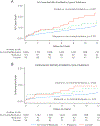Cocaine and Marijuana Use Among Young Adults With Myocardial Infarction
- PMID: 29535062
- PMCID: PMC6495189
- DOI: 10.1016/j.jacc.2018.02.047
Cocaine and Marijuana Use Among Young Adults With Myocardial Infarction
Abstract
Background: Substance abuse is increasingly prevalent among young adults, but data on cardiovascular outcomes remain limited.
Objectives: The objectives of this study were to assess the prevalence of cocaine and marijuana use in adults with their first myocardial infarction (MI) at ≤50 years and to determine its association with long-term outcomes.
Methods: The study retrospectively analyzed records of patients presenting with a type 1 MI at ≤50 years at 2 academic hospitals from 2000 to 2016. Substance abuse was determined by review of records for either patient-reported substance abuse during the week before MI or substance detection on toxicology screen. Vital status was identified by the Social Security Administration's Death Master File. Cause of death was adjudicated using electronic health records and death certificates. Cox modeling was performed for survival free from all-cause and cardiovascular death.
Results: A total of 2,097 patients had type 1 MI (mean age 44.0 ± 5.1 years, 19.3% female, 73% white), with median follow-up of 11.2 years (interquartile range: 7.3 to 14.2 years). Use of cocaine and/or marijuana was present in 224 (10.7%) patients; cocaine in 99 (4.7%) patients, and marijuana in 125 (6.0%). Individuals with substance use had significantly lower rates of diabetes (14.7% vs. 20.4%; p = 0.05) and hyperlipidemia (45.7% vs. 60.8%; p < 0.001), but they were significantly more likely to use tobacco (70.3% vs. 49.1%; p < 0.001). The use of cocaine and/or marijuana was associated with significantly higher cardiovascular mortality (hazard ratio: 2.22; 95% confidence interval: 1.27 to 3.70; p = 0.005) and all-cause mortality (hazard ratio: 1.99; 95% confidence interval: 1.35 to 2.97; p = 0.001) after adjusting for baseline covariates.
Conclusions: Cocaine and/or marijuana use is present in 10% of patients with an MI at age ≤50 years and is associated with worse all-cause and cardiovascular mortality. These findings reinforce current recommendations for substance use screening among young adults with an MI, and they highlight the need for counseling to prevent future adverse events.
Keywords: cocaine; marijuana; myocardial infarction; substance abuse; young adults.
Copyright © 2018 American College of Cardiology Foundation. Published by Elsevier Inc. All rights reserved.
Figures






Comment in
-
Cannabis and Heart Disease: Forward Into the Great Unknown?J Am Coll Cardiol. 2018 Jun 5;71(22):2552-2554. doi: 10.1016/j.jacc.2018.03.010. Epub 2018 Mar 10. J Am Coll Cardiol. 2018. PMID: 29535063 No abstract available.
-
Risk of Cardiovascular Disease Among Young Adults: Marijuana Use or the Company it Keeps.J Am Coll Cardiol. 2018 Sep 25;72(13):1559-1560. doi: 10.1016/j.jacc.2018.06.076. J Am Coll Cardiol. 2018. PMID: 30236320 No abstract available.
-
Cocaine and/or Marijuana Use and Myocardial Infarction.J Am Coll Cardiol. 2018 Sep 25;72(13):1560. doi: 10.1016/j.jacc.2018.06.075. J Am Coll Cardiol. 2018. PMID: 30236321 No abstract available.
-
Reply: Cocaine, Tobacco, and Toxicology in Myocardial Infarction of the Young.J Am Coll Cardiol. 2018 Sep 25;72(13):1561-1562. doi: 10.1016/j.jacc.2018.07.034. J Am Coll Cardiol. 2018. PMID: 30236322 No abstract available.
References
-
- National Institute for Drug Abuse. Nationwide Trends: Drug Facts. 2015. Available at: https://www.drugabuse.gov/publications/drugfacts/nationwide-trends. Accessed April 12, 2018.
-
- Amsterdam EA, Wenger NK, Brindis RG, et al. 2014 AHA/ACC guideline for the management of patients with non-ST-Elevation acute coronary syndromes: a report of the American College of Cardiology/American Heart Association Task Force on Practice Guidelines. J Am Coll Cardiol 2014;64: e139–228. - PubMed
-
- Moliterno DJ, Willard JE, Lange RA, et al. Coronary-artery vasoconstriction induced by cocaine, cigarette smoking, or both. N Engl J Med 1994; 330:454–9. - PubMed
Publication types
MeSH terms
Grants and funding
LinkOut - more resources
Full Text Sources
Other Literature Sources
Medical

